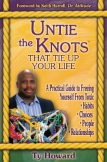Insensitive Remarks: How to Get Your Friends to Stop
Using Them Around You

Copyright © 2017 by Ty Howard. All rights reserved.
Last week, I presented a half-day training session on Cross-Cultural Sensitivity: Enhancing Employee Effectiveness at a corporation here in the State of Maryland. The session went really well, and like many of my previous training sessions there were a few employees from the company who came up to me with their personal questions after my training session concluded.
I received and answered seven questions, with one question resonating with me in such a way that it propelled me to write this article. The question was, “What can I do to get my boyfriend and friends to stop using insensitive and at times racially charged remarks when we’re hanging out together?”
This particular employee was a Caucasian female in her late twenties and she went on to share with me, “I was raised in a Christian family that does not see skin color, differences, political views or religion as a hindrance to your happiness. I was taught to love and respect everyone around me, regardless of their status in life. Now, as a young adult, I have a boyfriend and friends where when we hang out with at one another’s home or in public at our favorite hangout spots without fail at some point, I will hear them begin using insensitive and at times racially charged remarks, in regular conversation, as if nothing is wrong with their choice of words. I have told them on numerous occasions that this bothers me and makes me feel very uncomfortable, yet the behavior continues. Ty, what can or should I do? They normally just laugh, continue on, and act as if at some point I will give in and conform to their beliefs and behavior.”
My answer to the courageous employee:
When I was a senior in school, I was one of those (African American) students who would allow his friends get away with insensitive and racially charged remarks against students of a different race, disability or sexual preference because I did not want to look like a square (a person out of touch with what was expected to be in the in-crowd) by calling them out; even though I knew this behavior made me feel uncomfortable because I was not raised or conditioned this way at home. I too was never cool with the way my friends made insensitive remarks in reference to other students or people whenever we were hanging out together. To be fully honest here, I laughed quite a few of their insensitive remarks off and chimed-in a few times to make myself appear like I was a member of the in-crowd.
One day while hanging out, my friend’s choice of insensitive words and remarks went too far and I could not let this continue, so I had to take action. I didn’t attack my friends or approach them in an explosive or angry manner. I approached them civilly and effectively using the following four strategies:
DEFEND THE VICTIMS OF INSENSITIVE OR RACIAL ABUSE
Never be afraid to courageously stop the conversation, so you can defend a friend or even a stranger who is being mocked or racially abused by insensitive remarks, regardless of whether the victim or victims are present or not. Go ahead, stop the cycle and say something!
• You do not need to be cruel, just show that you will not tolerate and allow those comments to continue. You can say “Why do you choose to say things like that?” Or “What you have said is insensitive or inappropriate, and against my values and beliefs.”
• If a victim who is present and aware of the insensitive remarks sees what you have just done, perhaps you will inspire them to defend themselves in a diplomatic and courageous way as well.
STRIKE BACK WITH KNOWLEDGE
When someone tells you something culturally insensitive or racist, say the last word and make sure it counts. Responding with knowledge can make you feel liberated. If someone says something culturally insensitive or racist, respond with events, facts or statistics that help you educate people who may have less knowledge about how these comments affect you and other people.
• Some comments originate from people’s ignorance, but words can hurt. You can comment “When you despise and make fun of people because of their differences, you perpetuate the belief that they are less than you.”
• You can also answer “When you say things like Asians talk funny English, you make a stereotype of a whole group of people, which is not fair to them.”
TELL YOUR FRIENDS TO STOP
If the toxic insensitive behavior is happening so often that it has moved beyond just bothering you, it’s probably gotten out of hand. Your friends may not even know how deeply it bothers you. It’s time for you to confront each friend alone, away from the group.
• Be clear about your reasons and expectations. Was there a particular incident that bothered you? What could he or she have done or said differently, that would have been okay with you?
• Try to be specific. If there is a specific subject you’d like to make off-limits, ask if he or she will stop using their insensitive and at times racially charged remarks around you, or stop using them altogether. If there is a certain friend who always seems to get the other friends going with insensitive and racially charged remarks, ask the other friends if they have ever noticed this happening – ask them to look out for it, in the future.
• Do not let your friends off the hook, if they are tuning you out and laughing you off. Sometimes people try to cover their toxic behavior by telling their victim, “Hey, lighten up!” or “Get a sense of humor!” Do not blame yourself, this is offensive behavior and it is happening to you. Respond once again, this time stating, “I do not want to hear that kind of talk, please stop using it when I am around.”
• If your continuous effort to stop this toxic behavior fails, you may have to let a friend or more go. Yes, it may be time to find and make new friends that share your values and beliefs. A true friend would not want to continue doing anything that seriously upsets you.
TEACH YOUR FRIENDS HOW TO IMPROVE THEIR CULTURAL COMPETENCE
Maybe your friends were not exposed to multiple cultures while growing up. Or maybe your friends grew up inside of a culture where they were taught and encouraged to use insensitive or racially charged remarks. Teaching about insensitivity and racism is important so that all people can learn what it is, how it hurts and how not to tolerate it. There are many books and educational webinars online that address cultural competence, insensitivity and racism.
• You can start by going online yourself and compiling a list of positive educational websites for your friends to go to, learn from, and increase their personal level of cultural competence.
• The choice of topic is based on the situations that you observe whenever you and your friends are together.
Insensitivity, racism and blatant hateful behavior has become an insidious problem around the world today. One SiriusXM Radio Talk Show Host calls it Conscious Stupidity. My goal with this article is to show that ‘WE’ despite skin color, languages, cultural differences or country of residence all have feelings, value, and purpose in life. We also deserve the peaceful opportunity to give and receive respect as we enjoy the moral fiber of our dignity.
As a Human Being, you may have to deal with people who make insensitive and hurtful comments about your race, gender, family, religion, disability, preferences, differences, beliefs, values, or your friend’s. Even if they are not true, these comments can be offensive. You should not silently tolerate these comments as a common part of your life. Defending yourself and joining other courageous defenders can make a difference in the world, one positive and awesome human being at a time.
Going forward, remember and teach: Respect starts with me (and you) and impacts others.
– End –
Hey! How exactly do you deal with your friend’s insensitive and at times racially charged remarks and behavior? Do you courageously speak up or not? Have you ever ended a friendship over it? Kindly tell us in the comment box below!
About the Author: Ty Howard,
Mr. Untie the Knots®,
Freeing Maximal Business, Performance & Human Potential Daily!
Ty Howard is an internationally recognized authority on organizational and managerial practices that optimize employee performance and success. He is the creator and lead facilitator of the trademarked “Untie the Knots®” Optimal Performance Process, and the author of Untie the Knots®: Improving Habits, Choices, People, Relationships, Performance and Results, as well as dozens of published articles on employee and organizational performance and development worldwide. For information on his programs and services, visit: http://www.tyhoward.com.
Click Here for MORE Ty Howard Quotations & Sayings
















